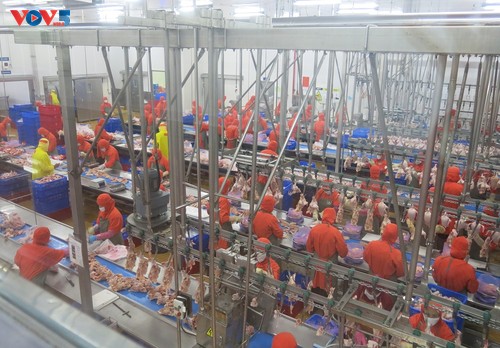 Developing a circular economy is an inevitable trend (Photo: VOV) Developing a circular economy is an inevitable trend (Photo: VOV) |
With the traditional linear economy, raw materials are extracted from the natural environment as inputs to the economic system and at the other end of the economic cycle, are discarded back to the natural environment. This cycle results in an accumulation of waste, depleted natural resources, and a polluted environment.
The circular economy, on the other hand, is a closed production cycle in which wastes are reused as raw materials for production, thereby reducing negative impacts on the environment, ecosystems, and human health. The aim of the circular economy is to prolong the life of products and increase the productivity of resources.
Mr. Nguyen Tien Huy, Director of the Business Office for Sustainable Development of the Vietnam Federation of Commerce and Industry, said: "Along with the green economy and the low-carbon economy, the circular economy model is considered a key to the efficient use of resources, addressing environmental pollution, and responding to climate change toward sustainable development and harmony between economic and environmental benefits. Transiting from a linear economy to a circular economy has created opportunities for Vietnam to increase its growth and has brought many benefits to the country and its businesses."
To promote the development of the circular economy, Vietnam needs to implement coordinated solutions from raising awareness and perfecting institutions to managing implementation. A number of mechanisms and policies to promote the circular economy have already been adopted. The 2020 Law on Environmental Protection requires sorting waste at the source, collecting waste fees based on volume, recycling and reusing waste, and manufacturers accepting liability.
A number of economic tools and policies have been implemented: a natural resources tax, an environmental protection fees and development of an environmental industry and environmental services. Vietnam has encouraged the collection and recycling of scrap metal, paper and agricultural production waste and gas recovery from livestock production waste.
Tran Thi Hong Minh, Director of the Central Institute for Economic Management, said: "International integration and new-generation FTAs require Vietnam to re-organize production to ensure sustainable development and promote circular economy development. We need to apply circular business models to achieve green growth and promote a green economy."
Promoting a circular economy will help businesses reduce the risk of overproduction or a scarcity of resources. It will create incentives for investment and technological innovation, reduce production costs, and increase supply chains. Compared with the linear economic model, the circular economy model will better help Vietnam fulfill its commitment to net zero emissions made at the United Nations Climate Change Summit in 2021.